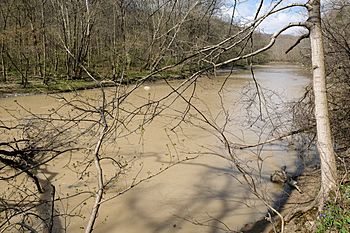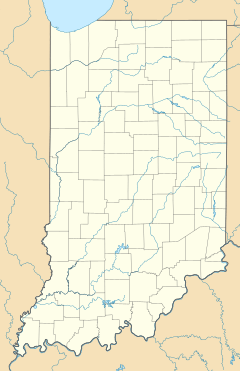Salamonie River facts for kids
Quick facts for kids Salamonie River |
|
|---|---|

The Salamonie River in Lagro Township
|
|
|
Location of the mouth of the Salamonie River in Indiana
|
|
| Country | United States |
| State | Indiana |
| Counties | Jay, Blackford, Wells, Huntington, Wabash |
| Physical characteristics | |
| Main source | near Salamonia, Indiana in Jay County 40°22′06″N 84°49′33″W / 40.3683793°N 84.8257967°W |
| River mouth | Wabash River near Lagro, Indiana 669 feet (204 m) 40°49′58″N 85°43′04″W / 40.8328218°N 85.7177603°W |
| Length | 84.4 miles (135.8 km) |
The Salamonie River is a river in eastern Indiana, United States. It flows into the Wabash River. A river that flows into a larger river is called a tributary.
The Salamonie River is about 84.4 miles (135.8 km) long. Its waters eventually join the Mississippi River. This happens through the Wabash and Ohio rivers. The USS Salamonie, a ship, was named after this river.
The Salamonie River's Journey
The Salamonie River starts its journey near Salamonia. This is in the southeastern part of Jay County. From there, it flows mostly towards the northwest.
As it travels, the river passes through several counties. These include Blackford, Wells, Huntington, and Wabash counties. Along its path, it flows by towns like Portland and Warren. It also goes past Pennville, Montpelier, and Mount Etna.
Finally, the Salamonie River meets the Wabash River. This happens in Wabash County, across from the town of Lagro.
Salamonie Lake and the Dam
In Wabash County, a large dam was built on the Salamonie River. The United States Army Corps of Engineers built this dam. They are a group that helps manage water projects in the U.S. The dam was finished in 1966.
The main reason for building this dam was to control floods. When there is a lot of rain, the river can overflow. The dam helps to hold back the extra water. This prevents flooding in nearby areas. The dam also created a large body of water called Salamonie Lake.
What Does "Salamonie" Mean?
The name "Salamonie River" was officially chosen in 1917. This decision was made by the United States Board on Geographic Names. This board helps to name places in the U.S.
Historically, the river has been called by a few different names. Some of these old names include "Salamanie River" and "Salamonia River." It was also sometimes called "Salamanic River."
The name "Salamonie" comes from the Miami Indian language. The Miami people are a Native American tribe. In their language, the word osahmonee means "yellow paint."
The Miami people used to make yellow paint from a plant. This plant is called bloodroot. It grew commonly along the banks of the Salamonie River.
 | Delilah Pierce |
 | Gordon Parks |
 | Augusta Savage |
 | Charles Ethan Porter |


